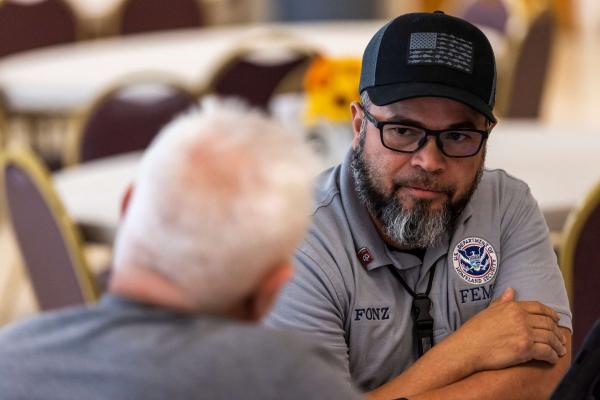On Monday, Israeli Prime Minister Benjamin Netanyahu doubled down on Israel’s war against Hamas, declaring in a speech that “this is a time for war” and rejecting growing calls from around the world for a cease-fire. Netanyahu argued that “calls for a cease-fire are calls for Israel to surrender to Hamas, to surrender to terrorism, to surrender to barbarism.” As followers of Jesus, we must disagree. Peace does not mean appeasement, nor does a cease-fire mean support for Hamas. Contrary to the logic of violence, there is no military solution to this crisis. This is a time for peacemaking — and that starts with a cease-fire.
Embracing Jesus’ call of peacemaking doesn’t mean we claim to have all the answers; I certainly don’t. Like many people, I have often felt powerless over the complexity and magnitude of this crisis in the weeks since the Oct. 7 terrorist attack by Hamas. I’ve struggled with how best to show heartfelt solidarity with my Jewish siblings who are experiencing rising antisemitism and who have told me they felt Israel was their “last safe place.” I’ve also wrestled with how to show deep solidarity with Palestinians who have experienced more than 70 years of forestalled efforts to secure rights to control their own destiny, as well as the daily humiliations, oppression, and violence of military occupation.
But here’s what I do know: Wars, by their very nature, often force people to choose sides and dehumanize the other side to justify violence. We’ve seen the dangers of this binary here in the U.S. as some student groups in support of Palestinian liberation have wrongfully praised or failed to condemn Hamas’ attacks, while some pro-Israeli groups (including many U.S. Christians) have failed to acknowledge the injustice of the ongoing occupation of Palestine and the severe death toll Israel’s response has inflicted on Gazan civilians. Yet while the powers of the world want us to take a side and declare ourselves fully (and exclusively) pro-Israeli or pro-Palestinian, Christian compassion must be freed from favoritism. As peacemakers, we must honor the image of God in every Israeli and every Palestinian.
Reject false binaries — and equivalencies
We must place ourselves alongside the hundreds of Israeli and international hostages Hamas is holding captive in Gaza, the 1,400 Israelis killed in Hamas’ attacks, and the more than 8,000 Palestinians who have been killed in homes, schools, churches, and refugee camps by Israel’s retaliatory bombing in Gaza. We should condemn Hamas’ attack as an indefensible act of terrorism while, at the same time, we criticize the state of Israel for its current ground invasion, 16-year blockade of Gaza, and longstanding military occupation of the West Bank. We must distinguish between Hamas, whose stated goal is the destruction of the state of Israel, and the struggle of Palestinians for self-determination and dignity. We can be clear that condemning Hamas’ actions does not negate calls for justice in Palestine, nor should condemning actions by the state of Israel be conflated with antisemitism.
Even as we reject false binaries, we must also reject false equivalencies about longstanding asymmetries in power. The U.S. is the most powerful nation in the world, and for decades we have provided billions of dollars each year to the Israeli military, while offering largely uncritical diplomatic support for the Israeli government’s actions. This support has been nearly unwavering despite Israel’s occupation of the West Bank and Gaza that began in 1967. After Hamas gained control of the Gaza Strip in 2007, a strict blockade jointly enforced by Israel and Egypt has led some human rights advocates to liken Gaza to an “open-air prison.” The death toll reflects this extreme power disparity: According to United Nations figures, 5,610 Palestinians and 244 Israelis were killed between 2008 and 2020, a disparity of nearly 23-to-1 in deaths. And the casualties from the past few weeks have far surpassed this 12-year period, something that should grieve us all.
Palestinian Christian leaders recently modeled what it means to reject false binaries and equivalencies in an open letter addressed to Western Christians. While making it clear that they “do not condone violence—not even by the powerless and occupied,” they challenged Western Christians to rescind their “unwavering support to Israel’s war against the people of Palestine” and lamented “the horrific context of oppression that many western Christian theologians and leaders have persistently ignored.” While I wish their letter had been more forceful in condemning Hamas’ horrific attack, these words from some of the people who have been deeply impacted by recent and ongoing violence should convict and challenge all of us as followers of Christ.
Seek the truth
In the fog of war, disinformation abounds; peacemaking means interrogating widespread assumptions, asking hard questions, and seeking the truth. For example, after the state of Israel declared war on Hamas, they immediately cut off water and electricity, dropped thousands of bombs, and began preparing for a ground invasion — a response that seemed to assume the only way to secure Israel was to eradicate Hamas from the Gaza strip, even at the expense of thousands of civilian lives. This response ignores that some Hamas leaders do not live in Gaza; that experts say crushing terrorism by military force rarely works; and that protracted violence against minority groups — including occupation and forced displacement — can motivate future acts of terrorism. We need to ask hard questions, including whether Israel’s stated goal of defeating Hamas is even feasible (and at what cost) and, should Israel succeed, who will govern Gaza? To date, the state of Israel has failed to offer any plans for how Gaza would be governed if they were successful in rooting out Hamas.
The state of Israel does have a right and duty to defend its citizens from terrorism and try to prevent future attacks — but the path to long-term security doesn’t start with missiles. Peacemakers must make other options to ensure the safety of Israel’s citizens more visible, especially options that do not perpetrate war crimes and sow the seeds of future violence.
Some of these alternatives include nonviolent strategies, such as working with regional countries to arrest Hamas leaders and bring them to justice and prioritize pursuing a political solution for Palestine alongside enforceable security arrangements for Israel. Other options include more limited military approaches: Foreign policy expert Richard Haass has argued that Israel could “carry out targeted strikes against Hamas leaders and fighters” as a more limited and effective response, alongside fortifying security along Israel’s border with Gaza. A cease-fire could enable a broader and healthier policy discussion around both the short- and longer-term approaches that take seriously Israel’s security while also seriously addressing root causes of terrorism.
Refuse to be idle
Asking these questions and articulating the truth matters, yet throughout scripture, God commands both truth and action — and forbids their opposites: “You shall not go around as a slanderer among your people, and you shall not stand idly by when the bloodof your neighbor is at stake: I am the Lord,” (Leviticus 19:16). Right now, refusing to stand idly by means advocating for our own government to use its power rightly.
While I’m dismayed by President Joe Biden’s repetition of the U.S.’ “unwavering” support for Israel, I’m grateful his administration used its considerable diplomatic influence to delay the ground invasion and has shifted its position to call for a humanitarian pause. We must now call on Biden to go a step further in applying maximum diplomatic pressure to negotiate a cease-fire as a way to prevent the current war from inciting a wider regional conflict and resume the flow of medical aid, water, food, and fuel in Gaza.
In mid-October, Biden announced that U.S. was sending $100 million in humanitarian aid to Gaza and the West Bank. Two days later, he requested more than $105 billion, primarily in military aid to Ukraine and Israel; only one-tenth of that amount (just over $9 billion) would go toward humanitarian aid for Palestinian, Israeli, and Ukrainian civilians. Though it’s unclear whether Congress will approve Biden’s proposed plan, allocating so much to war does not reflect the imperative to invest in peacemaking. The U.S. government could leverage its influence by making additional aid to Israel conditional on a negotiated cease-fire with Hamas and the provision of humanitarian aid into Gaza.
Proverbs says that “where there is no vision, the people suffer” (29:18), which some translations render as “where there is no vision, people cast off restraint.” Restraint. A word that is both loaded and imperative in this moment.
My greatest fear is that the state of Israel, backed by the unequivocal support of the U.S. government, will continue its war against Hamas in ways that constitute further war crimes and cause an even greater humanitarian catastrophe, which will, in turn, incite a vicious cycle of escalating regional conflict. Now is the time to restrain the ground invasion and bombing campaign. Continued war will blind Israel’s vision for seeing and pursuing alternatives that wield much better chances of ensuring long-term security. Peacemaking calls for both restraint and courageous and concrete actions that de-escalate the current conflict and open up new possibilities for more lasting peace, security, and justice.
Got something to say about what you're reading? We value your feedback!







